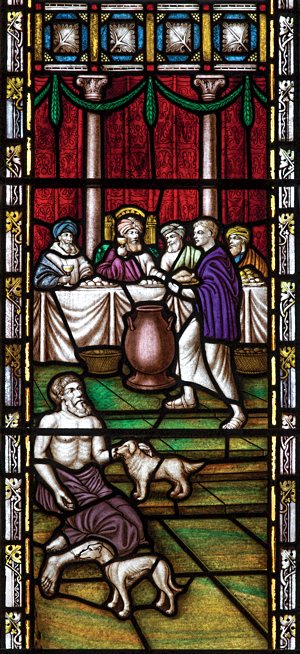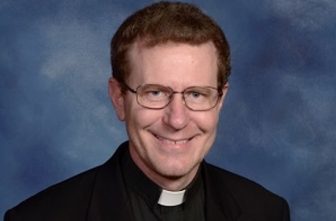
In the unsettling parable of Lazarus and the rich man in Luke 16:19-31, Jesus speaks of the fate of a rich man who enjoyed everything that money could buy yet insulated himself from the needs of the poor. While he feasted sumptuously every day, dressed in the finest clothes, he ignored the poor man who sat in pathetic misery outside his door, hungry and covered with sores that the dogs licked. Early Christian commentators saw those dogs as more merciful than the rich man.
After both men died, they woke up in the next life and found that their circumstances had changed dramatically. Lazarus, the poor man, was carried by the angels to “Abraham’s bosom,” heavenward. The rich man, on the other hand, found himself in Hades. His existence on earth had been full of comforts, but now he experienced torment, in the form of scorching fire. Whereas on earth everyone would have known the rich man’s name but not the poor man’s, in the afterlife it is just the opposite: we are told Lazarus’ name but not the rich man’s. We call him Dives (Latin for rich), but his name was not recorded in the book of life.
The rich man looks up from the flames and far off he sees Lazarus with Abraham. He begs for the mercy he never showed to Lazarus on earth. “Father Abraham,” he cries out, “Have mercy upon me, and send Lazarus to dip the end of his finger in water and cool my tongue; for I am in anguish in this flame” (v. 24). Abraham replies to his plea with three points of great significance:
1) The way we live has everlasting consequences. “Son, remember that you in your lifetime received your good things, and Lazarus in like manner evil things, but now he is comforted here, and you are in anguish” (v. 25). He was like another rich man in the Gospels who had come to Jesus asking him what he must do to be saved. He had kept all the commandments, and yet he went away sorrowful, for he could not grasp that it was the love of wealth which stood between him and the Lord. In Luke’s version of the Beatitudes, the poor are blessed (6:20), but woes await the rich (6:24). It is a theme found in Mary’s Magnificat (1:52).
2) The opportunity to repent ends at death. “Between us and you a great chasm has been fixed, in order that those who would pass from here to you may not be able, and none may cross from there to us” (v. 25). Even after death, the arrogance of the rich man continues. He calls for Lazarus to bring cool water to comfort him. He still doesn’t get it. All Lazarus meant to him was someone to call upon to serve his needs. Even in hell, the rich man’s self-centeredness endures.
When Jesus says that “a great chasm has been fixed” (v. 26), this means that the very purpose of the gulf between heaven and hell is to keep people from passing to and fro. This is one of the hardest teachings of the Gospel, one which modern ears stubbornly refuse to hear. St. John Chrysostom, who preached at least seven sermons on this parable, kept emphasizing this unbridgeable abyss to his congregation: “do not neglect the time of our earthly life, given to us by God’s kindness, for this is the opportunity for our salvation.”
3) Sin blinds a man to the truth. The rich man asks Abraham if Lazarus could be sent to his five brothers, to warn them to change their ways, lest they should also fall into hell when they die. But Abraham refuses: “They have Moses and the prophets. Let them hear them.” If a man cannot be compassionate with the Scriptures in hand and a destitute man on his doorstep, nothing — neither a visitor from another world nor a revelation of the horrors of hell — will reach him otherwise.
The early Christian poet Prudentius summed it up this way:
But until the perishable body
You will raise up, O God, and refashion,
What mansion of rest is made ready
For the soul that is pure and unsullied?
It shall rest in the patriarch’s bosom
As did Lazarus, hedged round with flowers,
Whom Dives beheld from a distance
While he burned in the fires everlasting.
(Hymn for Every Day 10.149–56)
Msgr. Steenson is ordinary emeritus of the Personal Ordinariate of the Chair of St. Peter, created by Pope Benedict XVI for those coming from the Anglican tradition to full communion in the Catholic Church. He now serves as vice president of the Coming Home Network.
Sunday, September 29
Twenty-sixth Sunday in Ordinary Time




